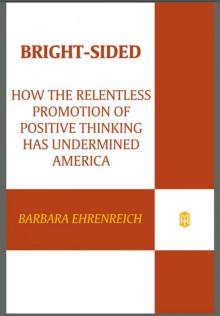- Home
- Barbara Ehrenreich
Bright-Sided
Bright-Sided Read online
Also by Barbara Ehrenreich
This Land Is Their Land: Reports from a Divided Nation
Dancing in the Streets: A History of Collective Joy
Bait and Switch: The (Futile) Pursuit of the American Dream
Nickel and Dimed: On (Not) Getting By in America
Blood Rites: Origins and History of the Passions of War
The Snarling Citizen
Kipper’s Game
The Worst Years of Our Lives:
Irreverent Notes from a Decade of Greed
Fear of Falling: The Inner Life of the Middle Class
The Hearts of Men:
American Dreams and the Flight from Commitment
Global Woman:
Nannies, Maids, and Sex Workers in the New Economy
(with Arlie Russell Hochschild)
Re-making Love: The Feminization of Sex
(with Elizabeth Hess and Gloria Jacobs)
For Her Own Good: 150 Years of the Experts’ Advice to Women
(with Deirdre English)
Witches, Midwives, and Nurses: A History of Women Healers
(with Deirdre English)
Complaints and Disorders: The Sexual Politics of Sickness
(with Deirdre English)
The Mean Season: The Attack on the Welfare State
(with Fred Block, Richard A. Cloward, and Frances Fox Piven)
BRIGHT-SIDED
BRIGHT-SIDED
How the Relentless Promotion
of Positive Thinking
Has Undermined America
Barbara Ehrenreich
Metropolitan Books
Henry Holt and Company
New York
Metropolitan Books
Henry Holt and Company, LLC
Publishers since 1866
175 Fifth Avenue
New York, New York 10010
[http://www.henryholt.com] www.henryholt.com
Metropolitan BooksTM and TM are registered
trademarks of Henry Holt and Company, LLC.
Copyright © 2009 by Barbara Ehrenreich
All rights reserved.
Distributed in Canada by H. B. Fenn and Company Ltd.
Library of Congress Cataloging-in-Publication data
Ehrenreich, Barbara.
Bright-sided : how the relentless promotion of positive thinking has undermined America / Barbara Ehrenreich.—1st ed.
p. cm.
Includes bibliographical references and index.
ISBN 978-0-8050-8749-9
1. Optimism—United States. 2. Happiness—United States. 3. Self-confidence— United States. 4. Success in business—United States. I. Title.
BF698.35.O57E37 2009
155.2'32—dc22
2009023588
Henry Holt books are available for special promotions
and premiums. For details contact: Director, Special Markets.
First Edition 2009
Designed by Meryl Sussman Levavi
Printed in the United States of America
1 3 5 7 9 10 8 6 4 2
To complainers everywhere:
Turn up the volume!
Contents
Introduction
ONE Smile or Die: The Bright Side of Cancer
TWO The Years of Magical Thinking
THREE The Dark Roots of American Optimism
FOUR Motivating Business and the Business of Motivation
FIVE God Wants You to Be Rich
SIX Positive Psychology: The Science of Happiness
SEVEN How Positive Thinking Destroyed the Economy
EIGHT Postscript on Post?Positive Thinking
Notes
Acknowledgments
Index
BRIGHT-SIDED
Introduction
Americans are a “positive” people. This is our reputation as well as our self-image. We smile a lot and are often baffled when people from other cultures do not return the favor. In the well-worn stereotype, we are upbeat, cheerful, optimistic, and shallow, while foreigners are likely to be subtle, world-weary, and possibly decadent. American expatriate writers like Henry James and James Baldwin wrestled with and occasionally reinforced this stereotype, which I once encountered in the 1980s in the form of a remark by Soviet émigré poet Joseph Brodsky to the effect that the problem with Americans is that they have “never known suffering.” (Apparently he didn’t know who had invented the blues.) Whether we Americans see it as an embarrassment or a point of pride, being positive—in affect, in mood, in outlook—seems to be engrained in our national character.
Who would be churlish or disaffected enough to challenge these happy features of the American personality? Take the business of positive “affect,” which refers to the mood we display to others through our smiles, our greetings, our professions of confidence and optimism. Scientists have found that the mere act of smiling can generate positive feelings within us, at least if the smile is not forced. In addition, good feelings, as expressed through our words and smiles, seem to be contagious: “Smile and the world smiles with you.” Surely the world would be a better, happier place if we all greeted one another warmly and stopped to coax smiles from babies—if only through the well-known social psychological mechanism of “mood contagion.” Recent studies show that happy feelings flit easily through social networks, so that one person’s good fortune can brighten the day even for only distantly connected others. 1
Furthermore, psychologists today agree that positive feelings like gratitude, contentment, and self-confidence can actually lengthen our lives and improve our health. Some of these claims are exaggerated, as we shall see, though positive feelings hardly need to be justified, like exercise or vitamin supplements, as part of a healthy lifestyle. People who report having positive feelings are more likely to participate in a rich social life, and vice versa, and social connectedness turns out to be an important defense against depression, which is a known risk factor for many physical illnesses. At the risk of redundancy or even tautology, we can say that on many levels, individual and social, it is good to be “positive,” certainly better than being withdrawn, aggrieved, or chronically sad.
So I take it as a sign of progress that, in just the last decade or so, economists have begun to show an interest in using happiness rather than just the gross national product as a measure of an economy’s success. Happiness is, of course, a slippery thing to measure or define. Philosophers have debated what it is for centuries, and even if we were to define it simply as a greater frequency of positive feelings than negative ones, when we ask people if they are happy we are asking them to arrive at some sort of average over many moods and moments. Maybe I was upset earlier in the day but then was cheered up by a bit of good news, so what am I really? In one well-known psychological experiment, subjects were asked to answer a questionnaire on life satisfaction—but only after they had performed the apparently irrelevant task of photocopying a sheet of paper for the experimenter. For a randomly chosen half of the subjects, a dime had been left for them to find on the copy machine. As two economists summarize the results, “Reported satisfaction with life was raised substantially by the discovery of the coin on the copy machine—clearly not an income effect.” 2
In addition to the problems of measurement, there are cultural differences in how happiness is regarded and whether it is even seen as a virtue. Some cultures, like our own, value the positive affect that seems to signal internal happiness; others are more impressed by seriousness, self-sacrifice, or a quiet willingness to cooperate. However hard to pin down, though, happiness is somehow a more pertinent metric for well-being, from a humanistic perspective, than the buzz of transactions that constitute the GDP.
Surprisingly, when psychologists undertake to measure the re
lative happiness of nations, they routinely find that Americans are not, even in prosperous times and despite our vaunted positivity, very happy at all. A recent meta-analysis of over a hundred studies of self-reported happiness worldwide found Americans ranking only twenty-third, surpassed by the Dutch, the Danes, the Malaysians, the Bahamians, the Austrians, and even the supposedly dour Finns. 3 In another potential sign of relative distress, Americans account for two-thirds of the global market for antidepressants, which happen also to be the most commonly prescribed drugs in the United States. To my knowledge, no one knows how antidepressant use affects people’s responses to happiness surveys: do respondents report being happy because the drugs make them feel happy or do they report being unhappy because they know they are dependent on drugs to make them feel better? Without our heavy use of antidepressants, Americans would likely rank far lower in the happiness rankings than we currently do.
When economists attempt to rank nations more objectively in terms of “well-being,” taking into account such factors as health, environmental sustainability, and the possibility of upward mobility, the United States does even more poorly than it does when only the subjective state of “happiness” is measured. The Happy Planet Index, to give just one example, locates us at 150th among the world’s nations. 4
How can we be so surpassingly “positive” in self-image and stereotype without being the world’s happiest and best-off people? The answer, I think, is that positivity is not so much our condition or our mood as it is part of our ideology—the way we explain the world and think we ought to function within it. That ideology is “positive thinking,” by which we usually mean two things. One is the generic content of positive thinking—that is, the positive thought itself—which can be summarized as: Things are pretty good right now, at least if you are willing to see silver linings, make lemonade out of lemons, etc., and things are going to get a whole lot better. This is optimism, and it is not the same as hope. Hope is an emotion, a yearning, the experience of which is not entirely within our control. Optimism is a cognitive stance, a conscious expectation, which presumably anyone can develop through practice.
The second thing we mean by “positive thinking” is this practice, or discipline, of trying to think in a positive way. There is, we are told, a practical reason for undertaking this effort: positive thinking supposedly not only makes us feel optimistic but actually makes happy outcomes more likely. If you expect things to get better, they will. How can the mere process of thinking do this? In the rational explanation that many psychologists would offer today, optimism improves health, personal efficacy, confidence, and resilience, making it easier for us to accomplish our goals. A far less rational theory also runs rampant in American ideology—the idea that our thoughts can, in some mysterious way, directly affect the physical world. Negative thoughts somehow produce negative outcomes, while positive thoughts realize themselves in the form of health, prosperity, and success. For both rational and mystical reasons, then, the effort of positive thinking is said to be well worth our time and attention, whether this means reading the relevant books, attending seminars and speeches that offer the appropriate mental training, or just doing the solitary work of concentration on desired outcomes—a better job, an attractive mate, world peace.
There is an anxiety, as you can see, right here in the heart of American positive thinking. If the generic “positive thought” is correct and things are really getting better, if the arc of the universe tends toward happiness and abundance, then why bother with the mental effort of positive thinking? Obviously, because we do not fully believe that things will get better on their own. The practice of positive thinking is an effort to pump up this belief in the face of much contradictory evidence. Those who set themselves up as instructors in the discipline of positive thinking—coaches, preachers, and gurus of various sorts—have described this effort with terms like “self-hypnosis,” “mind control,” and “thought control.” In other words, it requires deliberate self-deception, including a constant effort to repress or block out unpleasant possibilities and “negative” thoughts. The truly self-confident, or those who have in some way made their peace with the world and their destiny within it, do not need to expend effort censoring or otherwise controlling their thoughts. Positive thinking may be a quintessentially American activity, associated in our minds with both individual and national success, but it is driven by a terrible insecurity.
Americans did not start out as positive thinkers—at least the promotion of unwarranted optimism and methods to achieve it did not really find articulation and organized form until several decades after the founding of the republic. In the Declaration of Independence, the founding fathers pledged to one another “our lives, our fortunes, and our sacred honor.” They knew that they had no certainty of winning a war for independence and that they were taking a mortal risk. Just the act of signing the declaration made them all traitors to the crown, and treason was a crime punishable by execution. Many of them did go on to lose their lives, loved ones, and fortunes in the war. The point is, they fought anyway. There is a vast difference between positive thinking and existential courage.
Systematic positive thinking began, in the nineteenth century, among a diverse and fascinating collection of philosophers, mystics, lay healers, and middle-class women. By the twentieth century, though, it had gone mainstream, gaining purchase within such powerful belief systems as nationalism and also doing its best to make itself indispensable to capitalism. We don’t usually talk about American nationalism, but it is a mark of how deep it runs that we apply the word “nationalism” to Serbs, Russians, and others, while believing ourselves to possess a uniquely superior version called “patriotism.” A central tenet of American nationalism has been the belief that the United States is “the greatest nation on earth”—more dynamic, democratic, and prosperous than any other nation, as well as technologically superior. Major religious leaders, especially on the Christian right, buttress this conceit with the notion that Americans are God’s chosen people and that America is the designated leader of the world—an idea that seemed to find vivid reinforcement in the fall of Communism and our emergence as the world’s “lone superpower.” That acute British observer Godfrey Hodgson has written that the American sense of exceptionalism, which once was “idealistic and generous, if somewhat solipsistic,” has become “harder, more hubristic.” Paul Krugman responded to the prevailing smugness in a 1998 essay entitled “American the Boastful,” warning that “if pride goeth before a fall, the United States has one heck of a come-uppance in store.” 5
But of course it takes the effort of positive thinking to imagine that America is the “best” or the “greatest.” Militarily, yes, we are the mightiest nation on earth. But on many other fronts, the American score is dismal, and was dismal even before the economic downturn that began in 2007. Our children routinely turn out to be more ignorant of basic subjects like math and geography than their counterparts in other industrialized nations. They are also more likely to die in infancy or grow up in poverty. Almost everyone acknowledges that our health care system is “broken” and our physical infrastructure crumbling. We have lost so much of our edge in science and technology that American companies have even begun to outsource their research and development efforts. Worse, some of the measures by which we do lead the world should inspire embarrassment rather than pride: We have the highest percentage of our population incarcerated, and the greatest level of inequality in wealth and income. We are plagued by gun violence and racked by personal debt.
While positive thinking has reinforced and found reinforcement in American national pride, it has also entered into a kind of symbiotic relationship with American capitalism. There is no natural, innate affinity between capitalism and positive thinking. In fact, one of the classics of sociology, Max Weber’s Protestant Ethic and the Spirit of Capitalism, makes a still impressive case for capitalism’s roots in the grim and punitive outlook of Calvinist Protestantism, which
required people to defer gratification and resist all pleasurable temptations in favor of hard work and the accumulation of wealth.
But if early capitalism was inhospitable to positive thinking, “late” capitalism, or consumer capitalism, is far more congenial, depending as it does on the individual’s hunger for more and the firm’s imperative of growth. The consumer culture encourages individuals to want more—cars, larger homes, television sets, cell phones, gadgets of all kinds—and positive thinking is ready at hand to tell them they deserve more and can have it if they really want it and are willing to make the effort to get it. Meanwhile, in a competitive business world, the companies that manufacture these goods and provide the paychecks that purchase them have no alternative but to grow. If you don’t steadily increase market share and profits, you risk being driven out of business or swallowed by a larger enterprise. Perpetual growth, whether of a particular company or an entire economy, is of course an absurdity, but positive thinking makes it seem possible, if not ordained.

 Nickel and Dimed: On (Not) Getting by in America
Nickel and Dimed: On (Not) Getting by in America Living With a Wild God
Living With a Wild God Bright-Sided
Bright-Sided Bait and Switch: The (Futile) Pursuit of the American Dream
Bait and Switch: The (Futile) Pursuit of the American Dream Dancing in the Streets: A History of Collective Joy
Dancing in the Streets: A History of Collective Joy Had I Known
Had I Known Witches, Midwives, and Nurses
Witches, Midwives, and Nurses For Her Own Good: Two Centuries of the Experts Advice to Women
For Her Own Good: Two Centuries of the Experts Advice to Women Nickel and Dimed
Nickel and Dimed Dancing in the Streets
Dancing in the Streets Bait and Switch
Bait and Switch